
US talk of defending the ‘rules-based order’ is fooling no one
- Washington cannot claim to want to avoid a conflict with Beijing while simultaneously pushing its vision of a US-led global order – especially when such an order insists on excluding and outcompeting China in the Indo-Pacific and beyond
Members of the China policy elite in Washington, many of whom are arrogant but generally ignorant about Chinese history, have long held the view that the current rules-based international order is defined by universal values, never mind the ugly legacy attached to it. But this order is hardly inclusive and created for the benefit of humanity.
It is not even a peaceful and harmonious system, despite its benign-sounding name. All international orders are power politics by procedural means. They entrench the power of dominant states and allow them to exclude and subdue their rivals.
In fact, all major international orders of the past four centuries were led exclusively by Europeans and white peoples. They were orders of exploitation and racial exclusion, designed by dominant powers to destroy or outcompete rivals.

Indeed, the Treaty of Westphalia was designed to undermine the authority of the Catholic Church and the Holy Roman Empire. The post-Napoleonic peace established in Vienna was designed to uphold conservative monarchies to counter the rise of liberal revolutionary regimes.
The third international order, established after the Second World War and that we live under now, is based on the primacy of the first hegemonic actor in history to be a democratic but imperial state: the United States. It is sustained by a sub-imperial system, euphemistically called a democratic alliance, to perpetuate an order that is predominantly run by white people.
The West’s morbid anxiety to defend such an order is driven not by any noble motive to save humanity, but by the double fear of the decline of the Christian West and “yellow peril” sentiment disguised as normal great power competition.
The US desire to talk about “guardrails” is trumpeted as part of its goodwill in seeking engagement and cooperation. At the same time, while President Joe Biden has reiterated that the US does not support a “One China, One Taiwan” policy, the actions of his administration suggest otherwise. For one thing, the China head of the National Security Council seems to have even obtained a new title, senior director of China and Taiwan.
In sum, the US and China have reached such a fundamental state of mutual distrust that it has created an insurmountable psychological obstacle to reaching any compromise over Taiwan.
Unless Washington gives up its pretension of defending the exclusive “rules-based international order”, the idea of building an inclusive and cooperative relationship is a non-starter. In this scenario, the two countries may well sleepwalk towards a catastrophic ending sooner rather than later.
Lanxin Xiang is professor emeritus of the Graduate Institute of International and Development Studies in Geneva and a visiting scholar at the Belfer Center, Harvard Kennedy School


